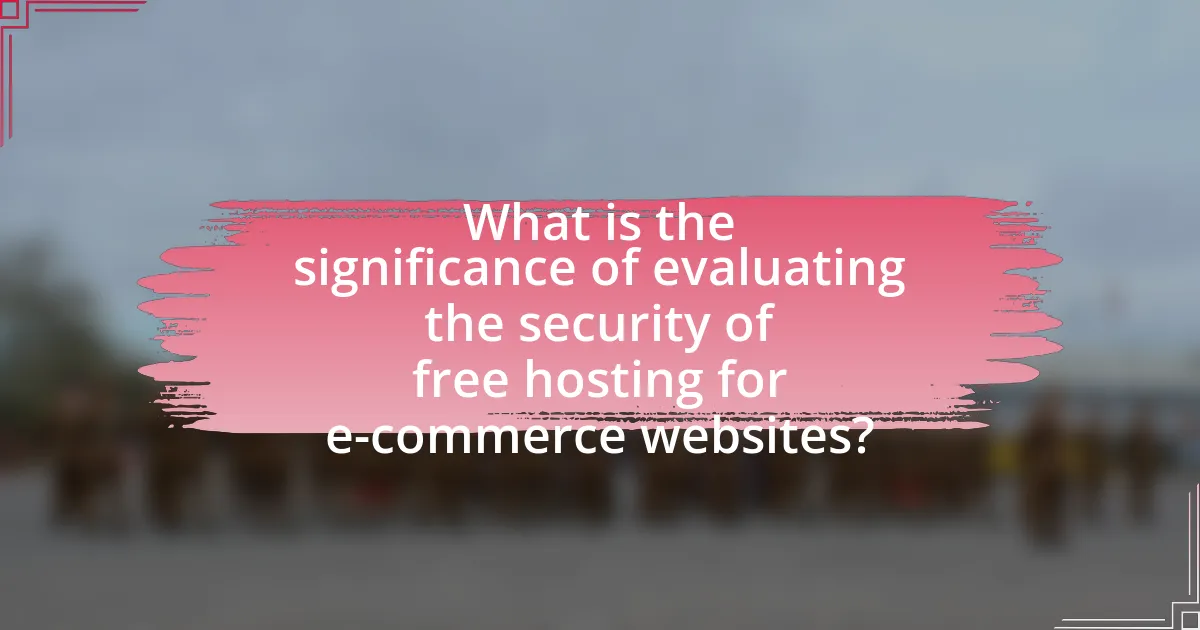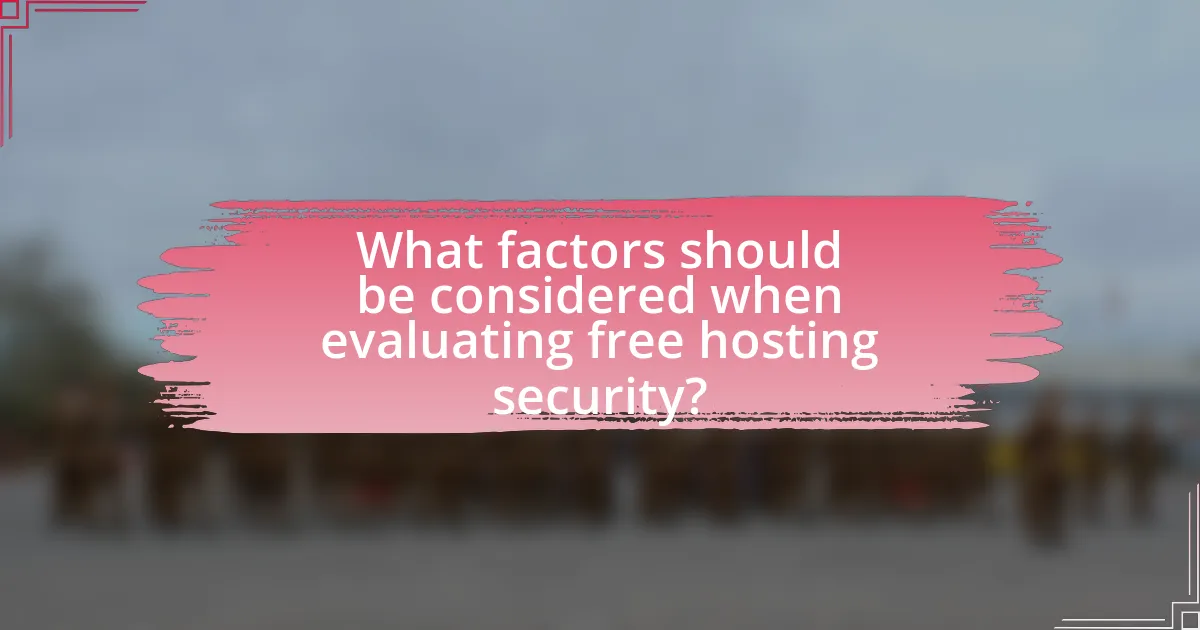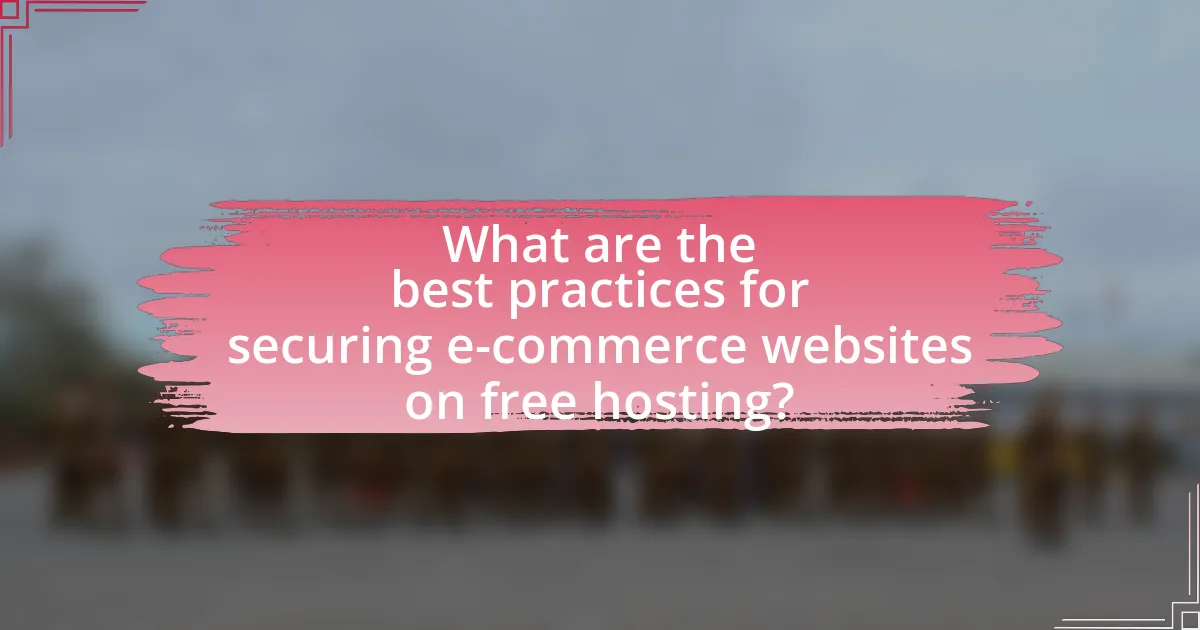Evaluating the security of free hosting for e-commerce websites is essential due to the significant risks associated with inadequate protection of sensitive customer data. Free hosting services often lack robust security measures, making e-commerce platforms vulnerable to data breaches, payment fraud, and other cyber threats. Key factors such as SSL certificates, firewalls, and regular software updates are critical for safeguarding customer information and maintaining trust. The article discusses the unique challenges posed by free hosting, the types of threats e-commerce sites face, and best practices for enhancing security, including the importance of strong passwords and two-factor authentication. Additionally, it highlights the financial implications of security breaches and the necessity of conducting regular security audits to ensure a secure online environment.

What is the significance of evaluating the security of free hosting for e-commerce websites?
Evaluating the security of free hosting for e-commerce websites is crucial because it directly impacts the protection of sensitive customer data and the overall integrity of the online business. Free hosting services often lack robust security measures, making e-commerce sites vulnerable to data breaches, hacking, and malware attacks. According to a report by Verizon, 43% of data breaches involve small businesses, many of which utilize free or low-cost hosting solutions. This statistic underscores the importance of assessing security features such as SSL certificates, firewalls, and regular updates to safeguard customer information and maintain trust.
Why is security a critical concern for e-commerce websites?
Security is a critical concern for e-commerce websites because they handle sensitive customer information, including payment details and personal data. The exposure of this information can lead to identity theft, financial fraud, and loss of customer trust. According to a 2021 report by Cybersecurity Ventures, cybercrime is projected to cost the world $10.5 trillion annually by 2025, highlighting the financial implications of inadequate security measures. Furthermore, a study by the Ponemon Institute found that the average cost of a data breach in 2021 was $4.24 million, emphasizing the need for robust security protocols to protect both the business and its customers.
What types of threats do e-commerce websites face?
E-commerce websites face various threats, including data breaches, payment fraud, and Distributed Denial of Service (DDoS) attacks. Data breaches occur when unauthorized individuals access sensitive customer information, which can lead to identity theft and financial loss. According to a 2021 report by IBM, the average cost of a data breach is approximately $4.24 million. Payment fraud involves the use of stolen credit card information to make unauthorized purchases, which can significantly impact the financial stability of e-commerce businesses. DDoS attacks disrupt website availability by overwhelming servers with traffic, causing potential revenue loss and damage to brand reputation. These threats highlight the importance of robust security measures for e-commerce platforms.
How can security breaches impact e-commerce businesses?
Security breaches can severely impact e-commerce businesses by compromising customer data, leading to financial losses and reputational damage. When a breach occurs, sensitive information such as credit card details and personal identification can be exposed, resulting in identity theft and fraud. According to a study by IBM, the average cost of a data breach in 2023 was $4.45 million, highlighting the financial repercussions for affected businesses. Additionally, a breach can erode customer trust; a survey by PwC found that 87% of consumers would not do business with a company after a data breach. This loss of trust can lead to decreased sales and long-term damage to brand reputation.
What are the unique challenges of using free hosting for e-commerce?
Using free hosting for e-commerce presents unique challenges such as limited security features, lack of customer support, and potential downtime. Free hosting services often do not provide robust security measures like SSL certificates or firewalls, making e-commerce sites vulnerable to data breaches and cyberattacks. Additionally, the absence of dedicated customer support can hinder timely resolution of issues, which is critical for maintaining operational continuity in e-commerce. Furthermore, free hosting platforms may experience frequent downtime or slow loading speeds, negatively impacting user experience and potentially leading to lost sales. These factors collectively pose significant risks to the security and reliability of e-commerce operations.
How does free hosting differ from paid hosting in terms of security?
Free hosting typically offers lower security compared to paid hosting due to limited resources and support. Paid hosting services often provide advanced security features such as SSL certificates, regular backups, and dedicated security teams, which are generally absent in free hosting options. For instance, a study by HostingAdvice found that 70% of free hosting services lack adequate security measures, making them more vulnerable to attacks. In contrast, paid hosting providers invest in robust security protocols, ensuring better protection for sensitive data, which is crucial for e-commerce websites.
What limitations do free hosting services impose on security measures?
Free hosting services impose significant limitations on security measures, primarily due to their lack of robust infrastructure and resources. These services often do not provide essential security features such as SSL certificates, firewalls, and regular security updates, which are critical for protecting sensitive data in e-commerce transactions. For instance, a study by the Cybersecurity & Infrastructure Security Agency (CISA) highlights that free hosting platforms frequently lack the capability to implement advanced security protocols, leaving websites vulnerable to attacks like data breaches and malware infections. Additionally, the shared nature of free hosting environments increases the risk of cross-site contamination, where vulnerabilities in one site can compromise others on the same server.

What factors should be considered when evaluating free hosting security?
When evaluating free hosting security, key factors include data encryption, server reliability, user access controls, and the hosting provider’s reputation. Data encryption ensures that sensitive information is protected during transmission, while server reliability minimizes downtime and potential data loss. User access controls limit who can access sensitive areas of the hosting environment, reducing the risk of unauthorized access. The hosting provider’s reputation is critical, as established providers typically have better security measures and incident response protocols in place. These factors collectively contribute to a more secure hosting environment for e-commerce websites.
How do SSL certificates contribute to e-commerce security?
SSL certificates enhance e-commerce security by encrypting data transmitted between a user’s browser and the web server, ensuring that sensitive information such as credit card details and personal data remains confidential. This encryption prevents unauthorized access and data breaches, which are critical in maintaining customer trust and compliance with regulations like the General Data Protection Regulation (GDPR). According to a study by the Ponemon Institute, 60% of small businesses that experience a data breach go out of business within six months, highlighting the importance of SSL certificates in protecting e-commerce transactions and sustaining business viability.
What is the role of encryption in protecting customer data?
Encryption plays a crucial role in protecting customer data by converting sensitive information into a coded format that is unreadable without the appropriate decryption key. This process ensures that even if data is intercepted during transmission or accessed without authorization, it remains secure and confidential. For instance, the use of Transport Layer Security (TLS) encrypts data exchanged between a customer’s browser and a website, significantly reducing the risk of data breaches. According to a report by Verizon, 94% of data breaches involve human error, highlighting the importance of encryption as a safeguard against unauthorized access and ensuring compliance with data protection regulations like GDPR.
How can businesses verify the presence of SSL on free hosting services?
Businesses can verify the presence of SSL on free hosting services by checking the website’s URL for “https://” instead of “http://”. This indicates that SSL is enabled, providing a secure connection. Additionally, businesses can use online SSL checker tools, such as SSL Labs’ SSL Test, which analyze the SSL certificate and its validity. These tools provide detailed information about the SSL configuration, including the certificate issuer and expiration date, confirming the presence and reliability of SSL on the hosting service.
What security features should e-commerce websites look for in free hosting?
E-commerce websites should look for SSL certificates, secure payment gateways, and regular backups in free hosting services. SSL certificates encrypt data transmitted between users and the website, ensuring secure transactions. Secure payment gateways protect sensitive financial information during transactions. Regular backups safeguard data against loss due to cyberattacks or server failures, which is crucial for maintaining business continuity. These features are essential for protecting customer information and maintaining trust in the e-commerce platform.
What types of firewalls are essential for e-commerce security?
The essential types of firewalls for e-commerce security include network firewalls, application firewalls, and next-generation firewalls. Network firewalls monitor and control incoming and outgoing network traffic based on predetermined security rules, providing a first line of defense against unauthorized access. Application firewalls specifically protect web applications by filtering and monitoring HTTP traffic, which is crucial for safeguarding sensitive customer data during transactions. Next-generation firewalls combine traditional firewall capabilities with advanced features like intrusion prevention systems and deep packet inspection, enhancing security against sophisticated threats. These firewalls are vital for maintaining the integrity and confidentiality of e-commerce transactions, as evidenced by the increasing number of cyberattacks targeting online retailers, which reached over 1.5 million in 2022 according to cybersecurity reports.
How do backup solutions enhance security for e-commerce websites?
Backup solutions enhance security for e-commerce websites by ensuring data integrity and availability in the event of cyberattacks or data loss. These solutions create copies of critical data, allowing businesses to restore their systems quickly after incidents such as ransomware attacks, which affected 37% of organizations in 2021 according to a report by Cybersecurity Ventures. By maintaining regular backups, e-commerce websites can mitigate the risks associated with data breaches and system failures, thereby protecting sensitive customer information and maintaining operational continuity.

What are the best practices for securing e-commerce websites on free hosting?
To secure e-commerce websites on free hosting, implement HTTPS, utilize strong passwords, and regularly update software. HTTPS encrypts data during transmission, protecting sensitive customer information. Strong passwords prevent unauthorized access, while keeping software updated mitigates vulnerabilities that could be exploited by attackers. Additionally, use security plugins to enhance protection and regularly back up data to recover from potential breaches. These practices are essential as free hosting often lacks robust security measures, making e-commerce sites more susceptible to threats.
How can e-commerce businesses implement strong passwords and authentication?
E-commerce businesses can implement strong passwords and authentication by enforcing complex password requirements and utilizing multi-factor authentication (MFA). Complex password requirements should include a minimum length of 12 characters, a mix of uppercase and lowercase letters, numbers, and special characters, which significantly reduces the risk of unauthorized access. According to a study by the National Institute of Standards and Technology (NIST), using MFA can block 99.9% of automated attacks, making it a critical layer of security. Additionally, businesses should regularly prompt users to update their passwords and provide education on recognizing phishing attempts, further enhancing overall security.
What are the guidelines for creating secure passwords?
To create secure passwords, use a combination of at least 12 characters, including uppercase letters, lowercase letters, numbers, and special symbols. This complexity significantly increases the difficulty for attackers to guess or crack passwords. Research indicates that longer passwords with varied character types are exponentially harder to breach; for instance, a password with 12 characters can have over 4 trillion possible combinations. Additionally, avoid using easily guessable information such as birthdays or common words, as these can be quickly exploited by attackers using dictionary attacks. Regularly updating passwords and using unique passwords for different accounts further enhances security, reducing the risk of multiple accounts being compromised if one password is leaked.
How can two-factor authentication improve security?
Two-factor authentication (2FA) significantly improves security by requiring users to provide two distinct forms of identification before accessing an account. This additional layer of security mitigates the risk of unauthorized access, as even if a password is compromised, the attacker would still need the second factor, typically a code sent to a mobile device or generated by an authentication app. According to a study by Google, implementing 2FA can block up to 99.9% of automated attacks, demonstrating its effectiveness in protecting sensitive information, particularly for e-commerce websites that handle financial transactions and personal data.
What steps can be taken to monitor and respond to security threats?
To monitor and respond to security threats, organizations should implement a multi-layered approach that includes continuous monitoring, threat intelligence, incident response planning, and regular security assessments. Continuous monitoring involves using automated tools to track network traffic, system logs, and user activities for anomalies. Threat intelligence provides insights into emerging threats and vulnerabilities, enabling proactive measures. Incident response planning ensures that organizations have predefined procedures to follow when a security breach occurs, minimizing damage and recovery time. Regular security assessments, including vulnerability scans and penetration testing, help identify weaknesses in the system before they can be exploited. These steps are essential for maintaining the security of e-commerce websites hosted on free platforms, where vulnerabilities may be more prevalent.
How can website owners conduct regular security audits?
Website owners can conduct regular security audits by implementing a systematic approach that includes vulnerability scanning, code reviews, and compliance checks. Vulnerability scanning tools, such as Nessus or Qualys, can identify security weaknesses in the website’s infrastructure. Code reviews should focus on identifying insecure coding practices, ensuring that all software components are up-to-date, and verifying that security best practices are followed. Additionally, compliance checks against standards like PCI DSS for e-commerce sites can help ensure that the website meets necessary security requirements. Regular audits, ideally on a quarterly basis, help maintain a secure environment and protect sensitive customer data.
What tools are available for monitoring website security?
Tools available for monitoring website security include intrusion detection systems (IDS), web application firewalls (WAF), and security information and event management (SIEM) solutions. Intrusion detection systems, such as Snort, analyze network traffic for suspicious activity, while web application firewalls like Cloudflare protect against common threats such as SQL injection and cross-site scripting. Security information and event management solutions, such as Splunk, aggregate and analyze security data from various sources to identify potential security incidents. These tools are essential for maintaining the security of e-commerce websites hosted on free platforms, where vulnerabilities may be more prevalent.
What are the common pitfalls to avoid when using free hosting for e-commerce?
Common pitfalls to avoid when using free hosting for e-commerce include limited security features, lack of customer support, and potential downtime. Free hosting services often do not provide robust security measures, making e-commerce sites vulnerable to data breaches and cyberattacks. Additionally, the absence of reliable customer support can hinder timely resolution of issues, impacting business operations. Furthermore, free hosting platforms may experience frequent downtime, which can lead to lost sales and damage to brand reputation. These factors collectively undermine the reliability and security necessary for successful e-commerce operations.
What are the risks of neglecting software updates and patches?
Neglecting software updates and patches significantly increases the risk of security vulnerabilities, leading to potential data breaches and system compromises. Outdated software often contains known vulnerabilities that cybercriminals exploit; for instance, the 2017 Equifax breach, which exposed sensitive information of 147 million people, was due to failure to patch a known vulnerability in Apache Struts. Additionally, neglecting updates can result in decreased system performance and compatibility issues, as newer applications may not function correctly with outdated software. Overall, the risks include increased susceptibility to malware, loss of sensitive data, and potential financial losses due to fraud or legal repercussions.
How can poor customer support affect e-commerce security?
Poor customer support can significantly compromise e-commerce security by delaying the response to security breaches and vulnerabilities. When customer support is inadequate, issues such as data breaches or payment fraud may go unaddressed for extended periods, allowing attackers to exploit weaknesses. For instance, a study by the Ponemon Institute found that organizations with poor incident response capabilities can incur costs up to 30% higher during a data breach compared to those with effective support systems. This highlights that timely and effective customer support is crucial for mitigating risks and ensuring the security of e-commerce platforms.
What practical tips can enhance the security of e-commerce websites on free hosting?
To enhance the security of e-commerce websites on free hosting, implement HTTPS to encrypt data during transmission, which protects sensitive information like credit card details. Additionally, regularly update software and plugins to patch vulnerabilities, as outdated systems are prime targets for attacks. Employ strong, unique passwords and enable two-factor authentication to add an extra layer of security against unauthorized access. Utilize a web application firewall (WAF) to filter and monitor HTTP traffic, providing protection against common threats such as SQL injection and cross-site scripting. Finally, conduct regular security audits and vulnerability assessments to identify and address potential weaknesses in the website’s security posture.















